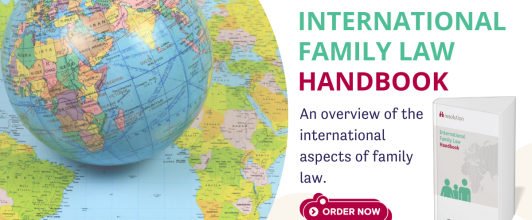
The Review
The Review is Resolution's bi-monthly magazine for members. Publishing six times a year with a mix of features, law and practice and news from the regions.
Broad range of information for professionals and practitioners in family law and justice.
Showing 141 - 160 of 518

The Review is Resolution's bi-monthly magazine for members. Publishing six times a year with a mix of features, law and practice and news from the regions.

Resonate is a new blog from Resolution, bringing together voices from across family law to share insight, experience and both personal and professional perspectives
As part of Resolution's Code of Practice members are asked to use the Good Practice Guides as part of their day to day work. These represent Resolution's core values and are designed to offer knowledge and guidance to our members.

Resolution Together is a way of working that allows lawyers to work with and advise couples jointly, including providing appropriate legal advice, through a divorce or separation.

Find resources on mediation, collaborative practice, arbitration and more.

This list of recommendations of family lawyers in other jurisdictions has been compiled by the members of Resolution's International Committee based on their working experience. The lawyers on this list are not Resolution members - unless indicated - and as such are not endorsed or recommended by Resolution.
Karin Walker’s conference webinar ran through the wide variety of DR options now available and set out their respective merits.
Cultural and systemic change are needed in family dispute resolution workplaces if we are to tackle the wellbeing crisis.
The EDI Committee is working hard on a number of projects. These cast a spotlight on various aspects of EDI: the privileges that many of us as members have, as well as the additional challenges that many others of us have to manage, at times battle with, and at other times are able to celebrate. These additional challenges and privileges of course reflect those of the general public - our clients that we all do our best to assist in our professional lives.
The Nuffield report on changing court demographics makes fascinating reading. It proves, for example, that the court are now dealing with more challenging and complicated cases.
Family practice is changing now more rapidly than it ever has done before. Just imagine prior to March last year when the vast majority of court hearings were face-to-face, when online mediation and collaborative practice was rare, and the Family Mediation Council would not allow mediators to conduct mediation information and assessment meetings by Skype or Zoom, save in the most exceptional circumstances.
The recently launched Resolution ‘Wellbeing in Family Law Report’ makes sobering, if not unsurprising, reading.
• 89% of respondents have experienced negative wellbeing because of their work.
• 26% of respondents are currently considering leaving the profession due to concerns over wellbeing.
Each month, Resolution pulls together all the latest news for legal aid practitioners. This is the July 2021 edition.
With the outbreak of Covid-19 many of you will not be at your offices to receive your printed copy of The Review but help is at hand. For every issue we will be publishing the articles here in the Knowledge and Resources section of our website as well as the pdf of the printed version.
A key theme of this year’s Resolution National Conference was wellbeing. We are all currently well aware of the additional strain that family lawyers are under at the moment due to increased workloads, juggling working from home with the office, and managing and working with our clients in these difficult and unprecedented times.
“Trauma does not just happen to other people - it happens to us, our friends and family and our neighbours. While humans are an extremely resilient species, able to rebound from relentless wars, family violence and man-made disasters, experiences like these inevitably leave traces: on our minds, our emotions and even our biology and immune systems. This matters not just to those who are directly affected, but to the people around them.”
This was an informal and thought-provoking workshop, run by Jo O’Sullivan, Remyhs Baker, Oscar Davies, Bridget Garrood and Stephen Lue. They took turns to provide a candid account of their individual experiences both in a work and personal context.
This interactive and thought-provoking workshop was run by Jacinta Gallant and Jo O’Sullivan. It started off with music to get everybody moving and get our brains into gear on a Monday afternoon.
Friday’s National Conference offerings included a presentation by Alan Larkin, “Only Connect: Staying relevant in a digital world”. I had not encountered Alan before. I came to realise he is an incredible but humble innovator. Somebody needs to publicise his contribution to our community.
I was delighted to have been able to attend so many great sessions during the week of Resolution’s National Conference this year. As an enthusiastic collaborative practitioner and arbitrator, I was keen to sign up to the session on the new collaborative participation agreement, hosted by Angela Lake-Carroll and Adele Ballantyne.
As family lawyers, we are used to referring parties to mediation, but it is rare for us to have insight into what actually goes on at those sessions and the importance of the conversations that take place there. Mary Raymont and Margaret Kelly-Edwards took the participants of this workshop, “The role of the lawyer in the mediation process”, swiftly into the world of role play, only too familiar to those who are qualified as mediators.
A divorce coach and family lawyer explain how working together can help our clients separate out emotions from decisions.
Reflective practice gives us time and space to understand how we are really feeling and how family law may be affecting our own wellbeing.
Every now and again there are moments in our journey as family lawyers which give pause and inspire us to re-examine the well-trodden path we have become so familiar with. As Resolution members, we are all well-versed in the range of non-court processes available to separating families (never more beautifully summarised than in Angela Lake-Carroll’s “Staircase of Opportunities”) and we no doubt endeavour to provide an early steer to our clients on the options which may be best suited to their circumstances.
Family lawyers are always avidly aware that a successful FDR hearing, or at the very least a clear indication, can make or break a case. The indications are important to move the matter forward and limit unnecessary expenditure, but also to guide both the client and the practitioner as to the likely interpretation of the court regarding the issues in dispute.